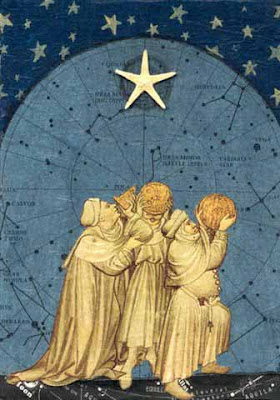TWELVETIDE - Following Yonder Star
"Old Christmas is past, twelve tide is the last
And we bid you adieu, great joy to the new"


"We have seen his star in the East"
The account in the Gospel of Mathew does not say what amount of time passed between the sighting by the Magi of the Star of Bethlehem and their arrival to honor the newborn King, but it is clear that the distances involved presented an undertaking of great magnitude and it is assumed that the Magi traveled by caravan in order to reach their destination safely and as quickly as possible.

"and, lo, the star, which they saw in the east, went before them,
til it came and stood over where the young child was"
til it came and stood over where the young child was"
In the centuries since the gospel of Mathew was first set down and carried into Europe by the missionaries of the Christian church, artists in many countries have seen the "wise men" in many different ways and the interpretation of the story of the Wise Men has expanded as well - although Mathew does not tell us how many Magi traveled to Judea, tradition has set the number at three, probably a reflection of the three kinds of gifts presented to the Baby Jesus - "gold, Frankencense, and Myrrh." Costumes, physical characteristics and style of dress have all changed to reflect the vision and cultural orientation of the artist who painted them; they've traveled by camel, by horse and on elephants, but it matters not whether we see them on camels in the desert, horses in the country side of Renaissance Italy or the exquisitely crafted figures of a Neapolitan creche scene, the Wise Men are instantly recognized as an exotic and mysterious part of the Christmas story.



.jpg)














2 Comments:
An extensive study of star patterns and historical events done by "that Christian biblical research group" I was involved with for so long revealed very strong evidence that the Christ child was about three years old before the Magi (who were astrologers, according to this study) actually arrived.
Thank you! I know that it has always been doubtful that the Magi actually arrived on Epiphany or Twelfth Day or Night, but I've never seen actual documentation for an actual "time!"
Post a Comment
Subscribe to Post Comments [Atom]
<< Home